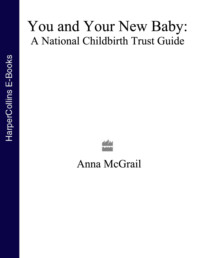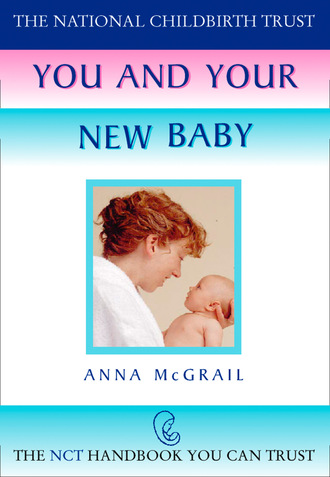
Полная версия
The National Childbirth Trust
FOR OTHER parents, the illness or the diagnosis are more uncertain.
The doctors didn’t diagnose Mary’s daughter Katie at first: ‘They went out and told Michael, who was waiting in the corridor, that we had a little girl and everything was fine, so of course, he couldn’t wait, didn’t even wait for me to come out of theatre, he went off and called his mum and my mum, and other people who had been waiting to hear the news, and it was only the next day that they came back to us and said things weren’t so good after all. Well, we’d already suspected – nothing definite, but there was something … And then when they came hack and said she had Down’s, well, we had her by then, and we loved her, so the worst thing was Michael having to go and phone everyone back again and tell them that things weren’t quite so wonderful after all. But we knew her then, so it was different.’
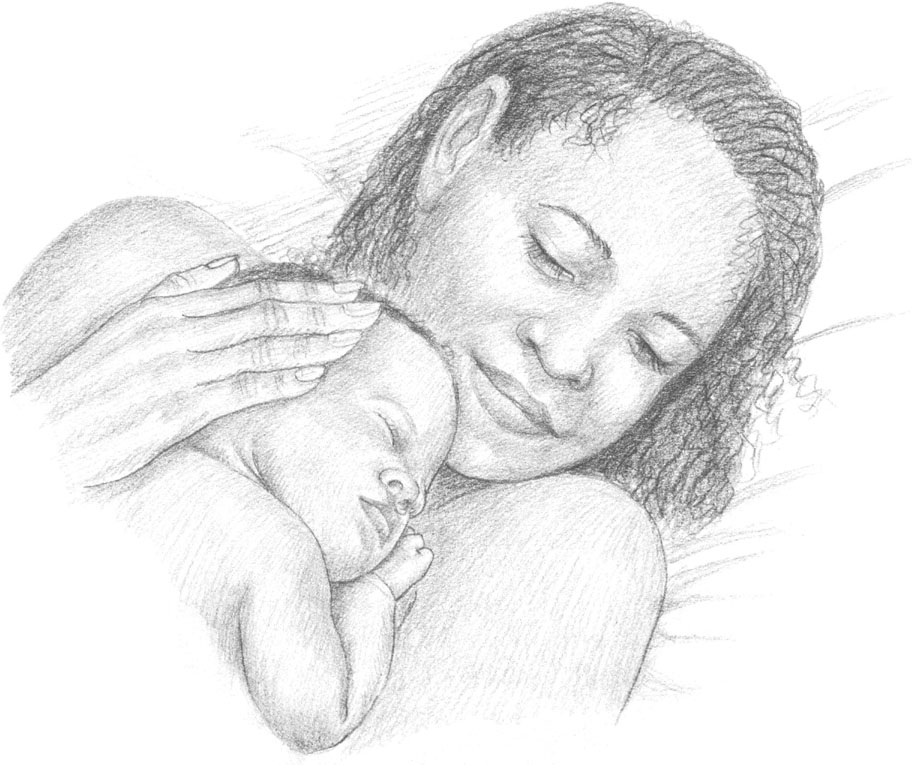
Stephen’s reaction seems dramatic, but is quite typical: ‘I didn’t want to touch her, I didn’t want to pick her up. All I could think of was that there was something wrong with her heart, and I felt like she was made of glass. She wasn’t mine. That’s all I could think. She wasn’t the baby I expected to have.’
IF YOUR BABY has been born with a disability, then you may well feel confused and resentful. More: you may feel angry, bitter, cheated. You may not even know how you feel except that you don’t feel right.
During this sad time, there is no right or wrong way to feel. Allow yourself time to come to terms with your feelings, and don’t think that this will happen overnight.
One of the main things you need, if you are struggling to come to terms with the child you have rather than the child you thought you were going to have, is information. The Directory at the end of this book gives details of many organisations who are there to offer you advice and support, and will help you through any difficulties, often by putting you in touch with other parents who have been through similar experiences. Other parents are often all too willing to help; they know what it is like. They know, better than anyone else, what you are going through. Make the most of them. But take it slowly …
Mary and Vicky express their inability to see beyond their own grief and shock: ‘Yes, we needed a lot of information, but there was also so much going on, every day, that we couldn’t take all the information in.’
‘I wasn’t coping on any level – physically, spiritually, emotionally. And I couldn’t read a Factsheet, the words didn’t make sense.’
Remember: Everyone needs to take the time they need. You know your needs. Take your time.
Learning to adjust to the reality of your baby’s condition also takes time, as Stephen and Bridget discovered: ‘Sometimes I felt really protective towards her, other times, if someone had come in and asked me if I wanted her taken away, I’d have said yes. And I’d have never looked back. But they didn’t come in. And then she was mine.’
BABIES WITH DISABILITIES
There are some specific stages that most parents whose baby is born with a disability will go through:
Shock:
Nothing can prepare you for this news; expect simply to feel numb: If someone asks, you may find yourself saying, ‘I don’t know how I feel.’
Denial:
There are not many parents who won’t ask the doctor: ‘How can you be sure?’
Grief:
Many parents whose baby is born with a disability or a developmental problem find that they go through a time of sorrow and grief – just as if they were grieving for someone. And they are. Parents need time to mourn the loss of the perfect baby they dreamed of before they can whole-heartedly welcome the child they have.
Anger:
This is another natural reaction. The anger can be directed at anyone, including your partner and your friends, especially if your friend’s own child is healthy. You may find yourself saying, ‘Why us?’
Guilt:
Many parents feel guilty, even if they are told categorically it could not have been their fault. You may find yourself thinking back over the events in your pregnancy and saying, ‘What did we do wrong?’
SHARING
When it comes to sharing what has happened, remember:
Most people will know very little about what has happened to your child. Be willing to explain as much as they need
Choose a time for talking when you can talk privately and without hurry
Have a positive attitude: it will help everyone be positive
It may help to have a checklist to cover important points.
‘What was awful was never knowing what was best. Other people knew best all the time. They had experience of this, and we hadn’t. We didn’t know anything. All the time we were having to say: “Is this how you do it? Is this what you do?” I expected just to get on with it, and I couldn’t.’
ONE PARTICULAR hurdle that parents whose child is born with a disability must face is telling others. How and when you tell people is your decision to make. Most parents, though, find that telling others as soon as possible is more helpful than not, and it is the best way to prevent misunderstandings.
Bereavement
IF YOUR BABY dies either just before birth (a stillbirth) or just after being born (a neonatal death) you will feel more anguish and pain than you ever thought was possible.
Some of you who are reading this book before your baby arrives will turn past these pages, not wanting to read them. ‘It doesn’t bear thinking about.’ That would have been my reaction, too. But for some parents, they have to think about it, the hardest thing of all: a death in a place where there is no place for it, in a room where we give birth.
It is beyond the scope of this book to support families through the loss of their baby. Only talking and specialised support can do that, and for this reason we include the names and addresses of specific organisations that can help in the Directory.
What we can also do here is to let parents think in advance of how they might cope with the loss of their baby, and to let you know some positive ways in which you can help each other through such a difficult and distressing time.
George speaks for many other grieving fathers: ‘People somehow expected me to be affected less than Anita. I was the one making the funeral arrangements, going to see the Registrar, all of that. It was as if I just had to get all that done and then I could go back to work and forget about it.’
Anita expresses her own anguish: ‘I was going to be a mother…and then I wasn’t… and then I realised I was a mother, and always would be, even if I didn’t have my baby with me any more.’
THERE ARE MANY local support groups run by and for parents who suffer a bereavement. They will allow you and your partner the opportunity to talk about how you both feel, express your feelings and grief and to share ways of coping.
REASONS
If you and your partner suffer a bereavement:
Find out as much information as you want and need as to the causes. This will help you to understand and to come to terms with what has happened
Do talk about the baby to each other. One of the saddest things about losing a baby near the time of birth is that no one else has had the chance to get to know this new little person. You know her better than anyone and can share your knowledge with each other
Give yourself plenty of time to grieve. Do not expect to pick up the threads of life again as if nothing had happened
Give your baby a name. This will help you to talk about her and see her as a person in her own right
Ask for a photograph of your baby. This will help you to remember her
Don’t blame each other – you are both angry: you have a right to be angry, but you need to find other ways of expressing that anger
Support each other – remember that your partner has also lost a child.
TRANSITION
IF YOUR BABY has been born in a hospital, you may find that leaving what feels like absolute safety, where there are experts and paediatricians on call 24 hours a day, and returning home, is a daunting experience. Parents whose baby has been born at home often feel something similar when the last of the midwives finally leaves and they are on their own – at last, with their new arrival. Although there is a physical journey involved in the transition from hospital to home, for all parents there is an emotional journey to be made. When you left, there were two of you, now there are three.
The reality may not hit you until you are actually back at home, as it did Kay: ‘I was in hospital for a week and all that time I kept thinking at the back of my mind that they’d never really let me leave with this baby because he wasn’t really mine. Of course, I’m saying all this, I knew he was mine, I knew it rationally, but deep down … I just kept having this niggling doubt that I’d have to hand him hack before I got in the lift to go home. It was a bit of a shock that I didn’t!’
Darren thought going home would be a time of rest and peaceful ‘daddyhood’: ‘Even before we left the hospital, on our way down in the lift, the nurse who was carrying the baby down for us was saying to Maureen, “Oh, it’s lucky you’ve got your husband at home for a few days, that’ll be a help,” and I was thinking, “What can I possibly do to help?” I had no idea of the work involved. I imagined that Maureen would breastfeed, the baby would sleep a lot, smile at me from time to time … and I would help, I’d change the odd nappy or two. But that was all. I had no idea.’
HOME MAY be the place you most want to be in the first few days, but even so, it can take some getting used to.
Naomi had been in hospital for quite a long time: ‘Although there are compensations, like you get your medicines brought round, and the meals just appear, there are still so many constraints; like, if your baby’s crying when the meal arrives, your dinner just goes cold – no one’s going to pop it in the oven for you because there isn’t an oven.’
Rowena’s husband began to long for some privacy, even at home: ‘People were in and out all those first few days and it seemed like we’d never get any peace and quiet. People kept saying things like, “Oh it’s so lucky you’ve got Peter here to help for a bit”, and I was getting cross because all I was doing to help was making them tea.’
David found himself impressed by Tina’s growing knowledge and let himself be guided by her: ‘We’d been living with Tina’s parents and had only moved into our own flat three or four weeks before and there were still things in boxes that we hadn’t got round to unpacking. We’d borrowed a cot from Tina’s sister and put it up in the bedroom, next to our bed, and Tina put the baby in there when we got back from the hospital because the baby was asleep, and he looked so small and lost in there I wanted to take him straight out again. But Tina had put him in, so I didn’t. She already seemed to know what was best because she’d been with him all the time in the hospital and I hadn’t.’
First days
YOU MAY BE new to the job and feel that you’re dependent on ‘experts’ but no one knows your baby as well as you already do. It is surprising how quickly we learn to read our baby’s signals, even when we may have had little to do with babies before. It is astonishing how much our instincts are right, and perhaps in itself this may give us confidence.
Philippa’s baby’s umbilical cord hadn’t quite healed properly: ‘So the midwife didn’t discharge us at ten days like she was supposed to and I was really disappointed by that. I wanted to move on, and I felt this was holding us back in some way. I wanted the reassurance that everything would be alright, but I also wanted to take on the responsibilities myself.’
With that responsibility, though, however much it is wanted and welcomed, can come uncertainty, as Sally clearly knows: ‘My brain has gone. It sometimes feels like a big empty space in my head where I used to do thinking. I don’t even look at newspapers any more because they don’t make sense. Or if I do pick up a newspaper, I always seem to find things in there that upset me, and more and more things upset me now. I end up crying over news stories. It feels much safer, in a way, just having me and Kevin in our little world.’
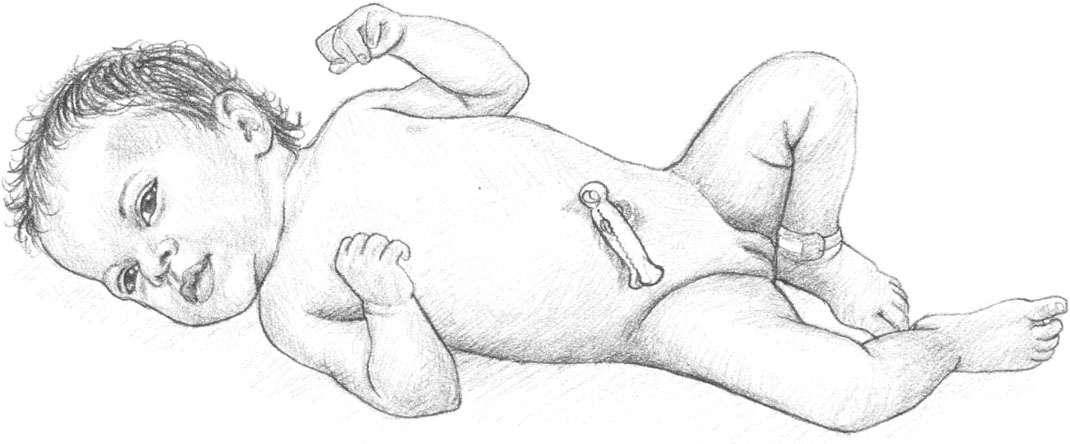
Umbilical clip.
THIS INSTINCT to nurture and protect, almost to make a ‘nest’, is very strong in many parents in the first weeks of their baby’s life. For some people, this ‘nesting’ instinct began to manifest itself in late pregnancy with an urge to repaint the spare bedroom. If, during late pregnancy, your nesting instinct prompted you to do something slightly more practical, like freeze a month’s worth of nutritious dinners, then you will be more thankful now than you could ever have believed. This is because, when your baby arrives, something odd seems to happen to time.
For Gillian the change was dramatic: ‘Life is so slow now, that’s the thing I can’t get used to. It takes all day to do anything. It’s ten in the morning and I’m still in my dressing-gown and the baby’s having her third feed of the day and I’m wondering if I’m ever going to be able to get dressed and get to the shops. And yet, because there’s never a moment to do anything or finish anything, it’s all packed in so tight and the time rushes by. What happens to it? This is the thing they don’t tell you.’
The rhythm of life is very different in these early days. Some parents adjust to it almost at once; others find the change of gear much more difficult to accept. Rose felt nothing could prepare her for how she would feel: ‘I found the first few weeks very difficult. Life was so different to how I imagined it was going to be, and so different to everything I’d ever experienced before, that I felt like I’d been thrown in the deep end and was going to drown, while all the time I smiled and everyone thought I was paddling along happily. I loved him, I loved him but I wasn’t enjoying him.’
As Yvonne points out, your daily pattern does change but sometimes it can seem slow to do so: ‘At about three months I thought I’d start giving Andrée some carrots mashed up or something, potato, things like that, and I gave her tiny amounts on the end of a teaspoon and she would spit some out and enjoy others, and I liked that, watching her decide. But more than anything I liked having something different to do. It felt like every day was going to be the same. Baths, feeds, nappy changes, showing her books … apart from the baby clinic, where they had a mother-and-baby club afterwards, there was nothing to make one day different from another. I might do a trip to the shops one day, a walk to the woods another. But that was it. I needed to feel that we were going to move on, that Andrée wasn’t always going to be totally dependent on me in this way, and I think those first teaspoonfuls of carrot were one way of reminding myself of that.’
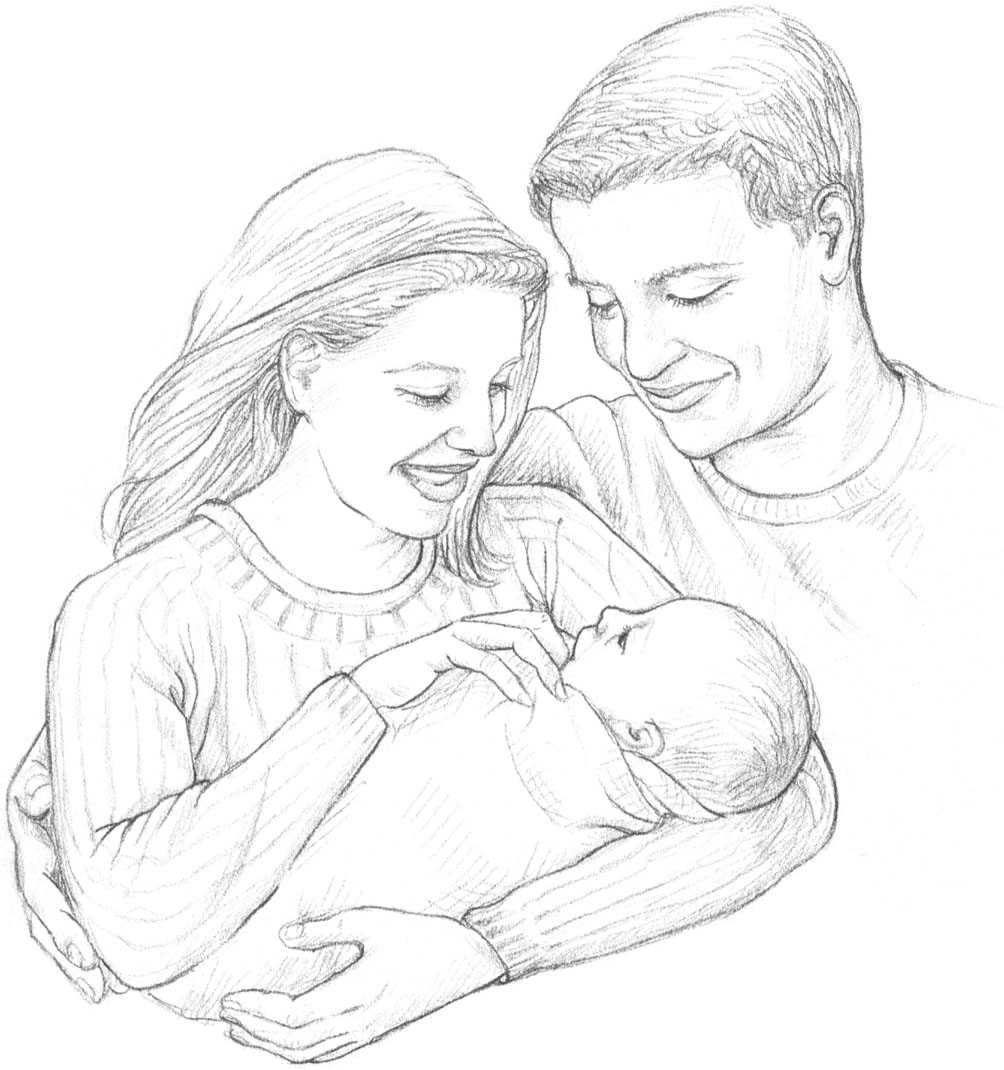
For some parents, the surprise is how much they take to parenthood, as Rachel happily remembers: ‘The one thing that I wasn’t prepared for is how lovely it would be. And I didn’t realise how happy I would be. People just don’t tell you that. When you’re a mother, you don’t find yourself saying to other mothers, “Isn’t this wonderful?” You find yourself saying, “Are Pampers or Boots nappies better?” So I didn’t know how absolutely wonderful it would be. There is a negative side, because I also didn’t realise how much my life … well, how unselfish you have to become. You always have to put the baby before yourself. You stop doing things you enjoy doing because the baby comes first. But I enjoy feeling that she depends upon me. It makes me feel very special.’
Amanda likes parenthood too: ‘People always seem glad to see you when you’ve got a baby. When you’re out shopping, people come over and talk to you and can be really friendly. I enjoy the days, just me and the baby.’
OTHER PARENTS will be surprised at how unhappy they suddenly feel, often for reasons they cannot quite articulate.
Beverley had a difficult delivery, forceps, 23-hour labour, pethidine: ‘It was really awful, and that did make a difference to how I felt afterwards, without a doubt. At least for the first, I should think the first four weeks, although I wouldn’t have been considered clinically depressed, I was suffering from some sort of depression, shock, whatever. I just couldn’t relate to Josh at all. People would say, “Oh, isn’t he lovely? Doesn’t he look great!” And I’d think, “Well, no.” It wasn’t until he was about four weeks old that I wanted to spend any time cuddling him, and then I did start to feel better. Also, because it was a traumatic birth, he was quite a whingey baby, and I didn’t really like him. I kept wanting to put him down. I think my husband got very depressed around that time as well. He used to say, “I don’t feel the way I thought I’d feel about Josh.” And I’d say, “Neither do I.” It was quite weird, and really horrible.’
DIFFERENT PEOPLE will tell you different stories about parenthood, but only you can know how you really feel: ‘People kept saying to me when she was tiny, “Oh, make the most of it, this is the best time.” And I thought it was the most dreadful time of my life. I thought, “If this is the best time, how am I going to cope when things get worse?” Then I met someone else who felt the same way, and her baby was slightly older, and she said to me: “This isn’t the lovely time, this is the horrible time. Things do get better.” And that was such a relief. Not everyone thinks it’s good, that very early bit, though you get so wrapped up in it.’
Baby blues
BABY BLUES do seem fairly universal. That is to say, they have been suffered by women in all cultures and all times when their baby is very tiny – usually around three or four days after delivery, when hormone levels drop and milk production kicks in. They are often linked with a sense of physical and emotional anticlimax after the birth. Nurses will often dismiss your tears with the label ‘three-day blues’, which is of no help when you can’t stop crying.
This is something Helen tried to explain: ‘The day Jo and I came out of hospital was very exciting. I was so glad to be home, and so pleased to sleep in my own bed again. But the next morning my breasts were enormous and solid, Jo was fretful, and everything just seemed to fall apart. I started crying and crying and didn’t really know why. I felt odd but I didn’t feel sad. The tears just came out of nowhere.’
THE FACT that these blues are so common, and always happen at around the same time, leads many experts to think that one of their causes is hormonal, though this explanation may not be much comfort.
‘I was sobbing and sobbing, though if someone had asked me why I’d have been hard pushed to tell them, and the nurse said, “Oh, a lot of you go through this – you’ll feel better tomorrow, believe me,” and that just made it worse. I thought, “How do you know?” I felt so unhappy, I couldn’t see myself ever smiling again. It all just seemed so pointless.’
Baby blues, whatever their cause, are usually all over by Day 10 at the latest. Few women find that this unusual sadness persists for longer. If it happens to you, it will help if not only you but your partner and perhaps other members of your family are prepared for the possibility. That way people will be able to reassure you that everything will be all right again, and with their reassurance and support, and patience, it soon will.
Helen has an extra remedy of her own, however: ‘I was so sad, so sad and Kieron was flapping about not knowing what to do, so partly to get him away from me because I wanted to be able to cry in peace, I’d say, “Oh, I could just eat a Marks & Spencer prawn sandwich”, and off he’d pop to Hammersmith to bring one back. And then he ran me a bath, and then he took Jo for a long walk … And none of it made the slightest difference at the time. It only lasted a couple of days, this weepiness, but it seemed eternal, and then it was gone, without me even noticing. But a long time afterwards I thought: what loving things to do. Everything Kieron could do, he did. And whenever I was feeling down with the baby, that thought would help.’
Puerperal psychosis
WITHOUT WANTING to alarm people, it didn’t seem fair to write a book about becoming a family and not mention this acute illness. Puerperal psychosis is an illness completely different in kind to the usual ‘baby blues’. It is different to ordinary depression, too. Puerperal psychosis is an illness that makes its sufferers feel totally alienated from reality, as Denise explains: ‘I was overjoyed when my baby girl was born … and the joy and excitement of those first few days did not wear off Instead, I became more and more elated. For someone who is generally reserved, this was a change in personality. This powerful feeling of joy was one I had never felt before – nor have I since ever felt so happy. I literally could not stop talking – I felt that I had so much I wanted to say, so much to do, that I didn’t feel the need for sleep. I lost all inhibitions and said whatever came into my head without pausing to think. My mind had gone into overdrive. I no longer had any control. I knew that something was wrong, and told the midwife who visited me at home that I was worried I was too “high” and might come crashing down. She just gave me a strange look. My GP thought it was good that I was enjoying motherhood so much. And I was. Being a mother was the most wonderful thing that had ever happened to me. And then everything fell apart. I began having involuntary thoughts about harming my baby – not so much thoughts as real pictures of causing her harm. What bewildered me was that I adored her…so why was my mind repeatedly trying to bash her brains out?’
There is no mistaking puerperal psychosis – it is qualitatively different to other forms of ‘depression’ following childbirth. Its onset is rapid, there is no slow build up, and it seems to be a reaction to the sudden changes in hormone levels that occur after labour. It may help partners and supporting relatives to know that this is an illness completely outside the woman’s control. She cannot ‘snap herself out of it’ and she cannot ‘be reasonable’. She needs medical help.
Sadie saw visions and was more concerned to alert her friends and family to the meanings of these than to look after her baby: ‘I saw God and then Jesus, who was telling me I had done wrong. And I knew my child would be taken by the Devil if I didn’t protect her.’
Most women with this illness will need to be hospitalised as they are unable to function effectively, and many take several months to recover as Denise continues: ‘I spent four weeks on an Acute Admissions ward, then four weeks in a Mother-and-Baby Unit in the psychiatric hospital. By the time I went for my postnatal check with my GP at eight weeks, I was starting to get back to normal. I felt very vulnerable, sitting there in the waiting room. I watched another mother come in and very capably start to change her baby’s nappy. The tears came suddenly and violently as it came home to me just how different I was to “normal” mums. I came home at ten weeks, but it took the best part of a year before I felt ‘myself again and not just going through the motions.’
But women who have puerperal psychosis do recover, although it may take a long time and the demands upon partners and family will be very great. Often relatives will need to care for the child and, depending on the medication and state of mind of the mother, breastfeeding may not always be possible.


